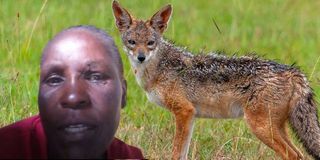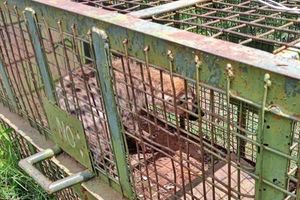
Esther Wanjiru, from Kiathangeti village in Kirinyaga County, succumbed to her injuries after being bitten by an African jackal on her coffee farm.
On November 21, 2024, Esther Wanjiru woke up as usual and, after breakfast, set off to work on her coffee farm.
The 51-year-old single mother had a daily routine of working for hours on her farm before retiring to her home.
That day, as she pruned her coffee bushes, Wanjiru had no idea that an encounter with an African jackal would leave her fighting for her life in hospital and later plunge the sprawling village of Kiathangeti in Kirinyaga County into mourning.
Unknown to Wanjiru, the wild animal first visited the home of her neighbour Anthony Njeru, where it attacked his seven-year-old son Norris Kathiari, inflicting serious injuries on the boy's legs and hands.
"I was picking tea on the farm when I heard my son screaming and knew he was in danger. I rushed home and was shocked to find the beast tearing at his legs. I hit it repeatedly with a stick and it fled. I saved my son's life," said Mr Njeru.
"Had I not reacted quickly, it would have devoured my son to death... After injuring him, the animal disappeared into a neighbour's farm where it met Wanjiru," he added.
Wanjiru later told her only son, Michael Munene, how the animal jumped on her and bit her right eye and right index finger.
Sensing danger, Wanjiru put up a spirited fight as she screamed for help. She grabbed the animal by the throat and tried to strangle it.
Distress calls
Fortunately, neighbours responded to the distress calls and rescued Wanjiru. They killed the animal but left her with serious injuries.
Wanjiru was rushed to Kabare Health Centre but later transferred to Kerugoya Referral Hospital where she was admitted for treatment. However, she died last Sunday while being attended to by doctors, leaving villagers, family and friends in shock.
"Wanjiru was a very courageous woman. She faced the animal and fought it with her bare hands while raising the alarm," said Mr Munene, the son.

Esther Wanjiru, from Kiathangeti village in Kirinyaga County, succumbed to her injuries after being bitten by an African jackal on her coffee farm.
The family said that after the attack, Kenya Wildlife Service (KWS) officials visited the scene, identified the animal as an African jackal and took away the carcass.
"The KWS came to investigate and took the dead animal away, promising to talk to us later. But so far they have not communicated with us," said Mr Munene,
"It is sad that we have lost our mother, we never expected her to die from injuries. The doctors told us that she was infected with rabies and was receiving anti-rabies medication at the time of her death," he added.
Residents now say jackals are roaming the village and posing a major threat to human life.
"We are living in fear because the jackals keep invading our homesteads and farms. We as villagers and our children don't feel safe and KWS should tame their animals," said Mr John Njogu, a resident.
"The jackals are killing and injuring our people and we will kill them if KWS doesn't take them back to Mt Kenya forest," he added.
Brave woman
The family demanded compensation for the loss of his mother, who was to be buried on Wednesday.
"We are making funeral arrangements and giving Wanjiru a decent send-off befitting a brave woman," he said.
According to the World Health Organization, dog bites and scratches cause 99 percent of human rabies cases and can be prevented by dog vaccination and bite prevention.
Once the virus infects the central nervous system and clinical symptoms appear, rabies is fatal in 100 per cent of cases. However, rabies deaths are preventable with prompt treatment, including cleaning of wounds and administration of a vaccine to prevent the virus from reaching the central nervous system.
To save his son, Mr Njeru rushed him to Kerugoya Referral Hospital and later transferred him to a private clinic where he was treated and discharged.
"At the clinic, my son was given anti-rabies medication and he responded well. Jackals are dangerous animals and KWS should ensure that they don't enter homes," he said.
As for Wanjiru, her family may never be compensated after KWS said attacks by the African jackal don't qualify for compensation.
Mr Allan Maina, KWS senior warden, said: "There is no compensation because the jackal is not on the list of wild animals that qualify for compensation when they attack or kill victims."
He also seemed to leave residents to protect themselves from attacks when he dismissed claims that several jackals were roaming the villages, saying the attack was an isolated case.









